|
|
|
Sort Order |
|
|
|
Items / Page
|
|
|
|
|
|
|
| Srl | Item |
| 1 |
ID:
167522
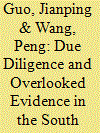

|
|
|
|
|
| Summary/Abstract |
In the South China Sea Arbitration, the Tribunal decided that China had not breached the due diligence obligation to protect and preserve the marine environment under Articles 192 and 194(5) of the United Nations Convention on the Law of the Sea concerning Chinese fishers fishing with explosives, but that China had breached the same obligation regarding Chinese fishers harvesting endangered species. This article looks at how the Tribunal interpreted and applied the due diligence obligation and argues, from a Chinese perspective, that there were facts overlooked by the Tribunal that China could have presented to counter the evidence of the Philippines, which might have been enough to affect the decision on destructive fishing had China participated in the Arbitration.
|
|
|
|
|
|
|
|
|
|
|
|
|
|
|
|
| 2 |
ID:
188877
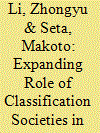

|
|
|
|
|
| Summary/Abstract |
Private actors and their roles in conserving the marine environment have attracted increasing attention. Although classification societies were originally designed as industrial organizations developing internal standards on hull and machinery, their contributions to the marine environmental protection should not go ignored. As exemplified by the Ballast Water Management (BWM) Convention, an international shipping instrument on ballast discharge for which the implementation process was subject to technological uncertainties, their contributions can be described in three ways: verification on behalf of states as “recognized organizations”; participation in International Maritime Organization (IMO) sessions; and establishment of their own standards. It is argued that these multiple functions reveal the competence of classification societies to tackle vessel-source pollution, and further, that their technical know-how and firsthand experience accumulated from shipping practice demonstrate their potential to address other complicated marine environmental issues where experience and compliance technologies are essential. However, the expanding focus of classification societies to marine environmental issues should proceed with caution. A much under-discussed point is the impact of classification rules and standards developed by the International Association of Classification Societies (IACS) on international shipping conventions as agreed by states. Though it cannot be said that classification societies are making their own vessel-source discharge standards independent from the IMO lawmaking process, the Unified Requirements on BWM system installation illustrate that obligations under international instruments could be de facto complemented by industrial standards, despite the fact that no provisions incorporating the latter are explicitly spelled out in the former. Given the noticeable lack of state consent throughout the private standard-setting process and the near-universal applicability of IACS standards, legitimacy concerns arise as to whether it is justified for classification societies to wield such an impact on the development of vessel-source pollution requirements, affecting both states and other maritime stakeholders. In this respect, a global administrative law perspective is taken to examine in what ways their legitimacy could be challenged.
|
|
|
|
|
|
|
|
|
|
|
|
|
|
|
|
| 3 |
ID:
178150


|
|
|
| 4 |
ID:
188395
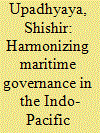

|
|
|
|
|
| Summary/Abstract |
Maritime safety and security remains an area of concern in the Indo-Pacific region, a vast integrated maritime space bound by trade and shipping connectivity. While multiple organizations have evolved over the years to address the various threats and challenges at the sub-regional level, the absence of an overarching institution that could synergize these efforts to improve wider maritime governance has hampered overall efforts. This article explains how such an ‘umbrella’ organization could be created to enhance maritime safety and security in the Indo-Pacific region.
|
|
|
|
|
|
|
|
|
|
|
|
|
|
|
|
| 5 |
ID:
184882


|
|
|
| 6 |
ID:
021989


|
|
|
|
|
| Publication |
Summer 2002.
|
| Description |
187-196
|
|
|
|
|
|
|
|
|
|
|
|
|
|
|
|
| 7 |
ID:
083789


|
|
|
|
|
| Publication |
2008.
|
| Summary/Abstract |
The paradigmatic shift in the concept of security now puts more stress on human security related to welfare of mankind in several ways. The concept of human security is a theme on which the research in an on-going process. Various political scientists, sociologists, economists, environmentalists, security and defense experts and the like are trying to study it from different angles, all with the purpose of better conceptualizing the concept and as well for finding out the means for making it more operational on ground. Interestingly, the concept is also being studied from a perspective that tries to link it with the other contemporary themes like globalization, human rights regime, environment regime, the phenomenon of collapsed state etc. In this respect, one notices very little efforts being expended to understand the concept from an oceanic perspective, notwithstanding the fact that the issues related to human security in the terrestrial environment find their relevance in the ocean medium too. However, such indifference to the marine dimension of human security cannot remain a long lasting phenomenon as the position of 'global oceans and seas' is currently in a state of crisis with impact on food security, health security, environmental security, personal security, community security of the individuals that depend on the ocean for their livelihood and sustenance. The management of oceanic affairs is a complicated task as ocean is a medium different from that of land. However, ocean governance is crafted in a manner that is capable of meeting many challenges that the oceans face at present. From human security perspective, meeting such challenges means prosperity and wellbeing of mankind. Bangladesh as a maritime nation also faces numerous critical human security problems in its maritime zone. It is, therefore, an imperative for the country to confront such challenges in line with the contemporary ocean governance.
|
|
|
|
|
|
|
|
|
|
|
|
|
|
|
|
| 8 |
ID:
103165
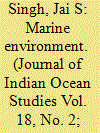

|
|
|
| 9 |
ID:
019960


|
|
|
|
|
| Publication |
Aug 2001.
|
| Description |
179-191
|
|
|
|
|
|
|
|
|
|
|
|
|
|
|
|
| 10 |
ID:
108591
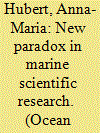

|
|
|
|
|
| Publication |
2011.
|
| Summary/Abstract |
Concerns about the negative effects of marine scientific research are in clear juxtaposition to the beneficial role that scientific knowledge plays in enhancing the understanding of the oceans and protecting the marine environment. This presents a regulatory paradox that is examined in this article in light of the legal framework in the 1982 United Nations Convention on the Law of the Sea. The article traces how these general principles in the Convention are elaborated in soft law instruments for the promotion of environmentally sustainable research practices. It also looks at an example of state practice in this area by examining regulatory measures instituted in the Canadian Endeavour Hydrothermal Vent Marine Protected Area.
|
|
|
|
|
|
|
|
|
|
|
|
|
|
|
|
| 11 |
ID:
114644


|
|
|
|
|
| Publication |
2012.
|
| Summary/Abstract |
This article identifies potential areas of cooperation in the South China Sea, particularly on ocean-related matters. Several regional mechanisms related to marine and coastal environments have been established and, to an extent, have achieved their goals. Nevertheless, some improvements to existing mechanisms are highly desirable. Recommended is a regional mechanism that involves all bordering parties; limits its geographic scope to the South China Sea; is initiated and operates without the assistance of global organizations; is embodied in a legally binding instrument; and broadens the scope of cooperation to include marine living resources, maritime safety, and maritime security.
|
|
|
|
|
|
|
|
|
|
|
|
|
|
|
|
| 12 |
ID:
127164
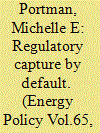

|
|
|
|
|
| Publication |
2014.
|
| Summary/Abstract |
This article examines a form of regulatory capture that occurs when significant ambiguity exists regarding the environmental protection standards for new types of activities in the marine environment. To begin with, there is little research that categorizes the typologies of regulatory capture despite the ubiquity of the phenomenon. After a discussion of theoretical approaches to regulatory capture, I describe the operative definition and theory appropriate to the situation related to authorization of oil and natural gas production in Israel following the discovery of large offshore reserves in 2010. This approach, embodying several facets of existing typologies, is applied to decisions made authorizing construction of the Gabriella offshore exploratory drilling platform. The analysis highlights the nature of capture in the absence of clear agency jurisdiction over new activities located in offshore environs organized as temporal and spatial "vacuums". I conclude that comprehensive marine spatial planning would result in less capture and the development of more capture-resistant regulations.
|
|
|
|
|
|
|
|
|
|
|
|
|
|
|
|
| 13 |
ID:
108289


|
|
|
| 14 |
ID:
181406
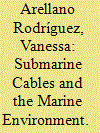

|
|
|
|
|
| Summary/Abstract |
Renowned for its unique flora and fauna, the Galapagos Archipelago is also home to a growing population of more than 25,000 people. Despite receiving approximately 200,000 tourists each year, and having governmental and nongovernmental offices, two airports, and various other human developments, the Archipelago’s telecommunications remain largely dependent on satellites. The absence of submarine telecommunication cables has not gone unnoticed, and the Archipelago is currently in the spotlight for two potential submarine cable projects. Although the environmental impact of submarine cables is generally deemed to be minimal, the pressure that new anthropogenic activities may add to the Galapagos cannot be disregarded. Two important aspects warrant specific attention in this regard: The Galapagos Archipelago’s surrounding waters have been designated as a marine protected area (MPA) and also a particularly sensitive sea area (PSSA) by the International Maritime Organization (IMO). Hence, using the Galapagos as a case study could serve as yardstick from which to assess the central question of this article: To what extent can coastal states regulate submarine cable operations for the protection and preservation of the marine environment?
|
|
|
|
|
|
|
|
|
|
|
|
|
|
|
|
| 15 |
ID:
190735
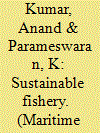

|
|
|
|
|
| Summary/Abstract |
The world ocean is a continuum that facilitates relatively free interchange among its parts and is of fundamental importance to studying environmental justice. Environmental justice sits within the larger ambit of social justice and equity. The article examines the effects of illegal, unreported, and unregulated (IUU) fishing within the Indian Ocean Region (IOR) on sustainability, and damage to the marine ecology, resulting in environmental and distributive injustice to the coastal communities. It also highlights the prevalence of IUU fishing on the high seas and in the exclusive economic zones (EEZ) of the coastal States vis-à-vis existing international fisheries laws. In addition, the article analyses the feasibility of managing the marine environment in the IOR through people’s participation, utilising the tenets of Commander’s Estimate of the Situation (CES), and suggests courses of action (CoAs) to achieve environmental justice. Further, it makes use of three case studies to assess the feasibility of people's participation in achieving sustainable fishing practices.
|
|
|
|
|
|
|
|
|
|
|
|
|
|
|
|
| 16 |
ID:
093479


|
|
|
|
|
| Publication |
2010.
|
| Summary/Abstract |
In the environmentally exposed Baltic Sea, a prolonged confrontation has set the transport interests of Russian crude oil against environmental interests, promoted by Russia's neighbours. During the 1990s all the Baltic littoral states - including Russia - collaborated well on marine environmental issues. When Russian oil exports accelerated after 1999, this environmental understanding broke down. Russian interests shifted as its oil income suddenly rose drastically. The confrontation peaked over a proposal to make the entire Baltic Sea into a particularly sensitive sea area (PSSA) under the International Maritime Organization (IMO). The proposal was adopted by the IMO in spite of Russian objections. The article shows how environmental interests trump transport interests in a manner that may not be sustainable. The case illustrates the need for environmental collaboration to be flexible in the face of shifting constellations of competing interests.
|
|
|
|
|
|
|
|
|
|
|
|
|
|
|
|
| 17 |
ID:
130592
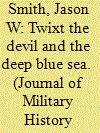

|
|
|
|
|
| Publication |
2014.
|
| Summary/Abstract |
The article examines the role of the marine environment in naval operations during the Spanish-American War era. Off Cuba, Puerto Rico, and the Philippines, naval commanders struggled with inaccurate charts in a complex marine environment. Long associated with the needs of maritime commerce, the Navy's charts and sailing directions could not account for the new strategic importance of these waters. Knowledge of the marine environment was increasingly critical to command of the sea. This article reveals ways in which marine environmental history can deepen our understanding of war at sea.
|
|
|
|
|
|
|
|
|
|
|
|
|
|
|
|
|
|
|
|
|